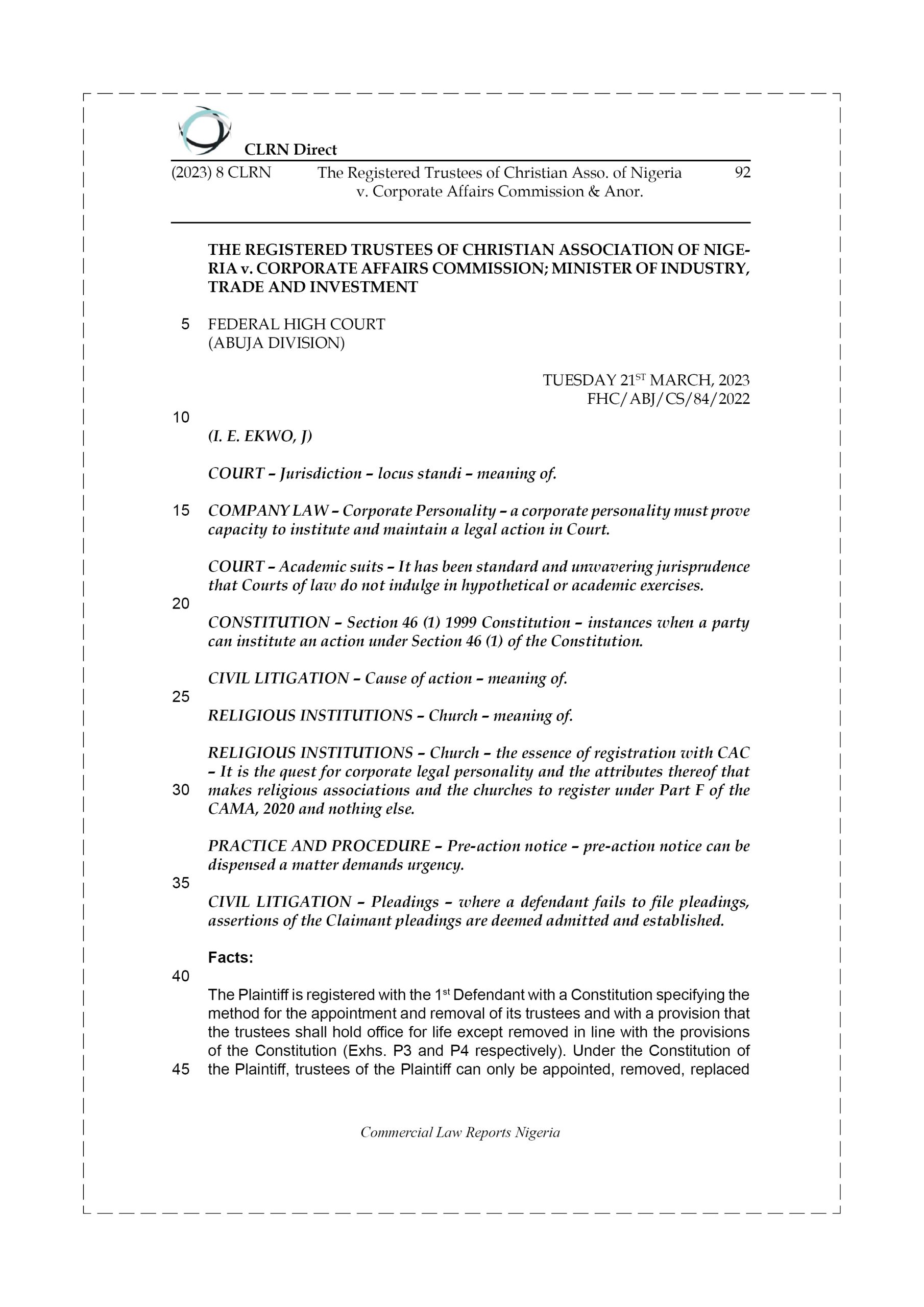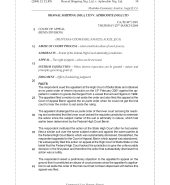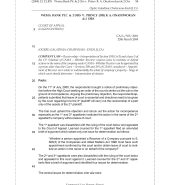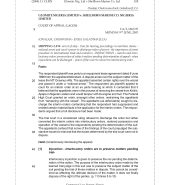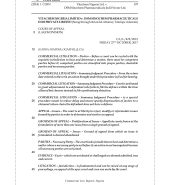-

NDIC v. Okem Enterprises Limited & Anor
- kg
1 × ₦1,000
-

Central Bank of Nigeria v. System Application Products Nigeria Ltd
- kg
3 × ₦1,000
-

Worldgate Building Society Ltd v. Merril Guaranty Savings & Loans Ltd
- kg
1 × ₦1,000
-

Nigergate Limited v. Niger State Government & 2 Ors
- kg
1 × ₦1,000
-

Glomite Nigeria Ltd v. Shellborn Marine Co. Nig. Ltd
- kg
2 × ₦1,000
-

Buckingham Ltd v. British-American Insurance Company Ltd
- kg
1 × ₦1,000
-

African Reinsurance Corp. v. Aim Consultant Ltd
- kg
1 × ₦1,000
-

Continental Iron & Steel Co. Plc v. Tejumola Nig. Ltd & Anor
- kg
1 × ₦1,000
-

RBF ENERGY RESOURCES LTD. & 2 ORS. v. QUAD MARINE OIL & GAS LTD. & ANOR.
- kg
1 × ₦1,000
THE REGISTERED TRUSTEES OF CHRISTIAN ASSO. OF NIGERIA v. CORPORATE AFFAIRS COMMISSION & ANOR.
₦1,000
In Stock
Facts:
The Plaintiff is registered with the 1st Defendant with a Constitution specifying the method for the appointment and removal of its trustees and with a provision that the trustees shall hold office for life except removed in line with the provisions of the Constitution (Exhs. P3 and P4 respectively). Under the Constitution of the Plaintiff, trustees of the Plaintiff can only be appointed, removed, replaced or suspended by the Standing Committee of the Plaintiff in accordance with the extant law of Nigeria. The manner of filling existing vacancies in the trusteeship position of the Plaintiff is provided for under the Constitution of the Plaintiff. The CAMA, in contravention of the powers of the Standing Committee of the Plaintiff empowers the 1st Defendant to suspend/remove trustees of an association including the Plaintiff and appoint interim manager(s) to manage the affairs of an association including that of the Plaintiff. The affairs of the Plaintiff are by the Constitution of the Plaintiff managed by the Plenary Session, which is the highest organ of the Plaintiff, the Standing Committee and Officers of the Plaintiff. As the General Secretary of the association, the informant is by the Constitution, the Chief Executive Officer of the Plaintiff responsible to the Standing Committee for the daily execution of the policies of the Plaintiff. He oversees the daily management of the affairs of the Plaintiff on behalf of the Standing Committee of the Plaintiff and that the day-to-day management of the affairs of the Plaintiff is not done by the trustees of the Plaintiff. If the 1st Defendant is allowed to suspend trustees and appoint interim managers to manage the affairs of the Plaintiff it will be usurping his powers under the Constitution and the powers of the Standing Committee and the Plenary Session which would not be in line with the Constitution of the Federal Republic of Nigeria which guarantees freedom of association, expression and religion. By the powers vested on the 1st Defendant by the CAMA to appoint interim managers to manage the affairs of an association, the 1st Defendant may appoint anyone who is not a member of the Plaintiff or of the faith of the Plaintiff to take over and manage the affairs of the Plaintiff contrary to the purpose for which the Plaintiff was set up and the freedom of association. It is only members of the member-organizations of the Plaintiff that can be appointed as a trustee of the Plaintiff under its Constitution. The CAMA empowers the 1st Defendant to dissolve an association and transfer the fund in the account(s) of such association to other association of its choice contrary to the provisions of the Constitution of Nigeria which guarantees freedom of association, religion, privacy and right to property. The Plaintiff’s existence is threatened by the above provision where if any of its accounts is declared to be dormant, the association (Plaintiff) can be dissolved on that basis only and its property transferred to any association not known to the Plaintiff. If the 1st Defendant is allowed to appoint managers and dissolve the Plaintiff or an association at will and transfer its assets to other association, it can cause great dissension and chaos amongst the members of the Plaintiff and individual members of the churches constituting the Plaintiff. The Plaintiff has its distinctive Logo, Sign, Character and Symbols with which it is identified in Nigeria and all over the world to accomplish its objectives. There are several churches/assemblies under the Plaintiff with their distinctive Logos, Signs, Characters and Symbols with which they are identified in Nigeria and all over the world to accomplish their objectives. The CAMA empowers the 2nd Defendant to prohibit the use of specific characters, signs or symbols of incorporated trustees which is not in consonance with the freedom of association and expression guaranteed by the Constitution of Nigeria. Except the Court intervenes, the Defendants will continue giving effect to the identified sections of the CAMA and regulations of the CR 2021 complained of in this suit. It is in the interest of justice to grant the reliefs contained on the face of the Originating Summons.
The 1st Defendant in response states that the CAMA 2020 makes provisions for the suspension and or removal of trustees and the appointments of Interim Managers for associations registered under the Act and in certain circumstances. The 1st Defendant has not exercised any of the powers complained of in the Originating Summons against the Plaintiff as there has been no cause to do so yet. The 1st Defendant is a law-abiding Commission and does not exercise its powers whimsically and arbitrarily as there are checks and balances in the CAMA 2020. The 1st Defendant further states that the provisions of CAMA 2020 being challenged by the Plaintiff do not infringe on the right of any person or persons to freely associate or assemble peaceably nor does it derogate from the right of any person or association of persons to acquire and possess property in Nigeria. The provisions seek to protect the properties of these associations (which are public interest entitles) and ensure that these properties are properly applied towards achieving the respective objects of the associations.
The objectives of provisions of CAMA 2020 being challenged by the Plaintiff are within the contemplations of the provisions of the 1999 Constitution (as amended) and the sections thereof are not in any way inconsistent with the provisions of the said Constitution. The provisions of CAMA 2020 only apply to associations registered and incorporated thereunder or established by law in Nigeria. Ss. 17 (2) (a) and (d), 839 (1), (7) (a) and (10), 842 (1) and (2), 843, 851 and 854 of the CAMA 2020 are not offensive, is not inconsistent with Ss. 4 (8), 6 (6) (b) and 40 of the 1999 Constitution (as amended) and do not infringe on the fundamental human rights of any persons or association under purview of the 1st Defendant. The fundamental rights of the Plaintiff are not open-ended, limitless and absolute, but are subject to limits as may be reasonably prescribed by law and demonstrably justified in a democratic society. Any limitations on the Plaintiff’s rights by operation of the sections of CAMA 2020 are consistent with the intent of the Constitution and reasonably justified in a democratic society in the public interest or for the purpose of protecting the rights and freedom of other persons.
Upon joining issues with the Plaintiff on the substantive matter, the 1st Defendant entered a Preliminary Objection challenging the jurisdiction of this Court to hear and determine this case on the grounds that: necessary parties were not before the court; the Plaintiff lacks the locus to file this action, as the Plaintiff cannot complain on behalf of other associations incorporated by the 1st Defendant; the claim of the Plaintiff is anticipatory, speculative and premature.
